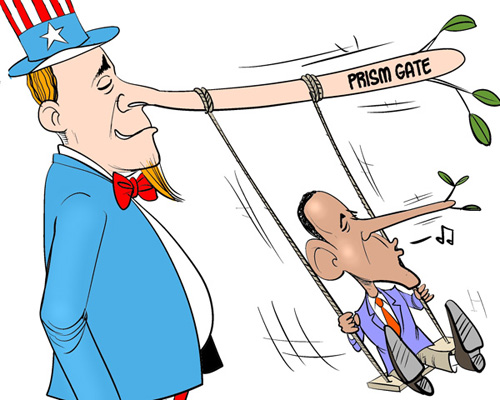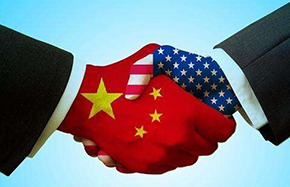The wolf and the lamb
By Xu Peixi (China.org.cn) Updated: 2013-07-29 10:41
 |
| Pinocchio Syndrome [By Jiao Haiyang/China.org.cn] |
Yet for now, let us be reasonable – even in a post-Snowden era. The abovementioned American accusations are "fair" in the sense that they leave China room to refute. Surely, the Chinese refutations have not been heard by a wider global public since the American commercial media often dominates the global public opinion and redemption has to come within the West. Let us just say it is "fair" for the simple reason that China is able to give an explanation.
As the fable goes, for every excuse the wolf comes up with, the lamb is able to refute the claims and back up its arguments with evidence. However, the American trick – dubbed "21st century statecraft" – has gone far beyond what the wolf in Aesop's fable could ever imagine. Let us here reiterate the rationale used by Mike Rogers, chairman of the House Permanent Select Committee on Intelligence. In his efforts to defame Chinese telecommunication companies Huawei/ZTE, he said: "China has the means, opportunities and motives to use telecommunication companies for malicious purposes." This charge implies a future tense that China is unable to rebut. In comparison with Mr. Rogers, the wolf in Aesop's fable is still being quite reasonable.
The dispute over cyber security in the post-Snowden era between the US and China has evolved onto psychological and cosmological levels. The issue of cyber security was discussed by a working group installed under the fifth China-US Strategic and Economic Dialogue. To many members of the global public, it appeared China wasted its chance at a full-fledged counterattack. Germany and Brazil, for example, would like to discuss the cyber security matter with the US, but their efforts did not materialize. The reason that China actually was able to do so, stemmed from the fact that the cyber security working group had been approved well before Snowden blew the lid off America's mass Internet surveillance, at the initiative of John Kerry and with the original purpose to shame China. Instead of fighting back, China asked for nothing but an explanation over the Snowden case and even this request was brushed aside. The Chinese philosophy behind this grand retreat is one of "live and let live," with the kind expectation that the US would take the message and back down. Nevertheless, this gesture was completely misinterpreted.
The US mistook China's kindness for cowardice. The reason behind this misinterpretation occurred on a cosmological level. The US adores the zero-sum game mentality, making China's reservations a stimulus for more American attacks. According to Norwegian peace researcher Johan Galtung, this American cosmological view of objects and people exists in terms of competition and tries to decide "who is best, who is worst, who wins and who loses." After a bizarre period of truce between both countries, running from early June when the first document was revealed through early July when the fifth China-US Economic and Strategic Dialogue started, the US went back to its old disapproving ways. During their so-called truce, China had wanted to give President Obama the benefit of the doubt and did not undertake any counterattack – despite its people learnt Chinese institutions had indeed been systematically hacked into. The US entered stand-off mode, mainly to observe China's reaction to the Snowden scandal. By the fifth China-US E&SD, the US thought it had figured China out and decided to resume its earlier accusations. Following American logic, when China is involved with espionage activity, it is called IPR theft. Whenever America does it, it is for the sake of national security.
If American accusations continue on the same level as before, China may still find it worthwhile to prove its innocence by providing counter evidence. However, politically-motivated American style accusations are bound to grow and self-escalate.
I would say that the abovementioned points to the typical American mentality that once it has gained any advantage over others (with the term "others" often referring to the former Soviet Union, large parts of Asia, the Middle East, Africa and the global South), it would use it against them; it mistakenly assumes China shares this same zero-sum mentality.
The American history is too short for it to realize that if you overstretch yourself, it will come back to you. In other words, the US need to follow the Dao in international relations. China has learned to respect this adage thousands years ago. "Whoever relies on the Dao in governance does not try to force issues or defeat enemies by force of arms because for every force there is a counterforce; violence, even well intentioned, always rebounds upon oneself" (taken from the "Dao De Jing," 551-479 BC, Para.30).
The American cyber, hot and cold warring mentality has to be dropped. Its propaganda of righteousness to showcase its moral superiority must be halted – unless it fixes its democracy deficit. My earlier analysis of the sudden rise of American accusations of China over cyber security issues were three-fold: to divert world attention over the American domination of Internet resources through the Internet Corporation for Assigned Names and Numbers, to create a new enemy to stimulate the imagination of the American public and bridge polarized party politics and to keep Chinese businesses out of the US in the name of national security while using its leverage to expand American business in China.
A solution for the aforementioned issues may already be overdue as severe harm has been done. The privacy and commercial secrets of global citizens and companies have been intercepted and/or stolen. There is also the particular element of the ultimate breaking point igniting a global sentiment of anger. American senior officials try to justify their actions to American citizens by saying that these activities are directed against foreign citizens. This kind of phrasing had Germans, Brazilians, Indians and Chinese speechless. The damage is done. However, fixing these problems would indeed make a fundamental difference: preventing the country from falling into fascism. At this time, governments ranging from China to Russia, France to Germany are surprisingly silent – with a few Latin American exceptions. By remaining silent, comes the possibility that many of these governments have become willing partners of hegemony and business interests. If that is the case, we will have to re-define the wolves and the lambs.
The author is a columnist with China.org.cn. For more information please visit:
http://china.org.cn/opinion/xupeixi.htm
Opinion articles reflect the views of their authors, not necessarily those of China.org.cn.












